
Isaac Frederick Marcosson (September 13, 1876 - March 14, 1961) was an American magazine editor.

Isaac Frederick Marcosson (September 13, 1876 - March 14, 1961) was an American magazine editor.
Marcosson was born in Louisville, Kentucky on September 13, 1876. He was educated in the schools of Louisville.
In 1903, he became associate editor of The World's Work , and in 1907, he became a member and financial editor of The Saturday Evening Post . From 1910 to 1913, he was editor of Munsey's Magazine .
He died on March 14, 1961, at the Doctors Hospital in Manhattan, New York City. [1]
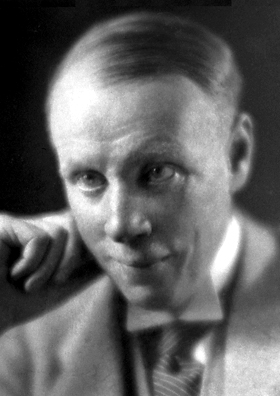
Harry Sinclair Lewis was an American novelist, short-story writer, and playwright. In 1930, he became the first author from the United States to receive the Nobel Prize in Literature, which was awarded "for his vigorous and graphic art of description and his ability to create, with wit and humor, new types of characters." Lewis wrote six popular novels: Main Street (1920), Babbitt (1922), Arrowsmith (1925), Elmer Gantry (1927), Dodsworth (1929), and It Can't Happen Here (1935).

Richard Harding Davis was an American journalist and writer of fiction and drama, known foremost as the first American war correspondent to cover the Spanish–American War, the Second Boer War, and World War I. His writing greatly assisted the political career of Theodore Roosevelt. He also played a major role in the evolution of the American magazine. His influence extended to the world of fashion, and he is credited with making the clean-shaven look popular among men at the turn of the 20th century.
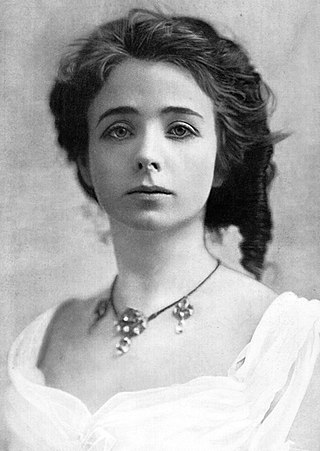
Maude Ewing Adams Kiskadden, known professionally as Maude Adams, was an American actress and stage designer who achieved her greatest success as the character Peter Pan, first playing the role in the 1905 Broadway production of Peter Pan; or, The Boy Who Wouldn't Grow Up. Adams' personality appealed to a large audience and helped her become the most successful and highest-paid performer of her day, with a yearly income of more than $1 million during her peak.
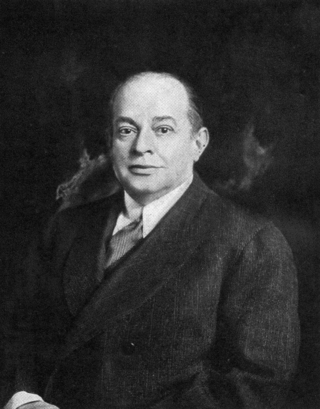
Charles Frohman was an American theater manager and producer, who discovered and promoted many stars of the American stage. Frohman produced over 700 shows, and among his biggest hits was Peter Pan, both in London and the US.

Mary Roberts Rinehart was an American writer, often called the American Agatha Christie. Rinehart published her first mystery novel The Circular Staircase in 1908, which introduced the "had I but known" narrative style. Rinehart is also considered the earliest known source of the phrase "the butler did it", in her novel The Door (1930), although the exact phrase does not appear in her work and the plot device had been used prior to that time. She also worked to tell the stories and experiences of front line soldiers during World War I, one of the first women to travel to the Belgian front lines.

Harold MacGrath was a bestselling and prolific American novelist, short story writer, and screenwriter. He sometimes completed more than one novel per year for the mass market, covering romance, spies, mystery, and adventure.

Joseph Alexander Altsheler was an American newspaper reporter, editor and author of popular juvenile historical fiction. He was a prolific writer, and produced fifty novels and at least fifty-three short stories. Thirty-two of his novels were part of his seven series:

The Curtis Publishing Company, founded in 1891 in Philadelphia, Pennsylvania, became one of the largest and most influential publishers in the United States during the early 20th century. The company's publications included the Ladies' Home Journal and The Saturday Evening Post, The American Home, Holiday, Jack & Jill, and Country Gentleman.

James Marie Hopper was an American writer and novelist. He was also an early college football player and coach, playing at the University of California, Berkeley in the late 1890s and then serving single seasons as head football coach at Nevada State University—now known as the University of Nevada, Reno—in 1900 and at his alma mater, California, in 1904. During his lifetime, Hopper published 450 short stories and six novels.
Ben Ames Williams was an American novelist and writer of short stories; he wrote hundreds of short stories and over 30 novels. Among his novels are Come Spring (1940), Leave Her to Heaven (1944) House Divided (1947), and The Unconquered (1953). He was published in many magazines, but the majority of his stories appeared in The Saturday Evening Post.

Maurice Francis Egan was an American writer and diplomat. He was a prolific writer and had a long and successful career as a Catholic journalist, literary critic, and novelist. He was a professor of English at two universities, and served as United States Minister in Copenhagen.
Clarence Budington "Bud" Kelland was an American writer. Prolific and versatile, he was a prominent literary figure in his heyday, and he described himself as "the best second-rate writer in America".

George Randolph Chester was an American writer and screenwriter, film editor, and director.

Ralph Delahaye Paine was an American journalist and author popular in the early 20th century. Later, he held both elected and appointed government offices.
Arthur Sullivant Hoffman was an American magazine editor. Hoffman is best known for editing the acclaimed pulp magazine Adventure from 1912 to 1927, as well as playing a role in the creation of the American Legion.

The Columbia Theatre or Loew's New Columbia Theatre in Boston, Massachusetts, was a playhouse and cinema located in the South End at No. 978 Washington Street. Charles Frohman, Isaac Baker Rich and William Harris oversaw the theatre until 1895. Owners included J.J. Grace of New York and Loews. Staff included Harry Farren, Saul Hamilburg and Philip Shea. The Columbia existed until its demolition in 1957.

Gouverneur Morris IV (1876–1953) was an American author of pulp novels and short stories during the early 20th century.
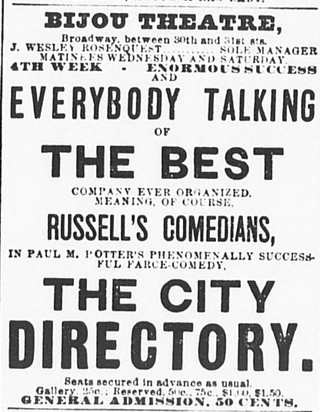
The City Directory is an 1889 American musical comedy play with a book by Paul M. Potter and music by W.S. Mullaly.

Larry Edward Evans was an American novelist and playwright. Several of his stories were performed on stage and adapted for film. Some of his work was serialized in Metropolitan Magazine , where Teddy Roosevelt was an editor during World War I. Evans was listed along with other "Famous Contributors" in an ad for Metropolitan in Theatre Magazine in 1921.
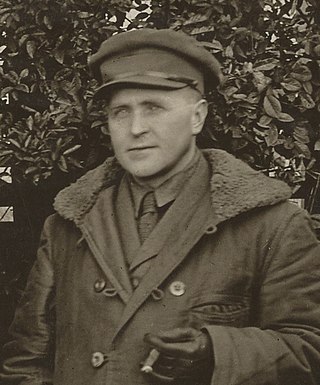
George Pattullo was a Canadian journalist and author who wrote articles and stories for various publications including the Saturday Evening Post, McClure's Magazine, American Magazine, and Popular Magazine. He also served as a World War I correspondent, and wrote several novels. One of his stories was the basis for the film Gasoline Gus . He was the first to report the wartime heroism of Alvin C. York. He was an editor at the Boston Herald. He wrote stories and novels about the American West after traveling it with photographer Erwin Smith during the summers of 1908 - 1910.